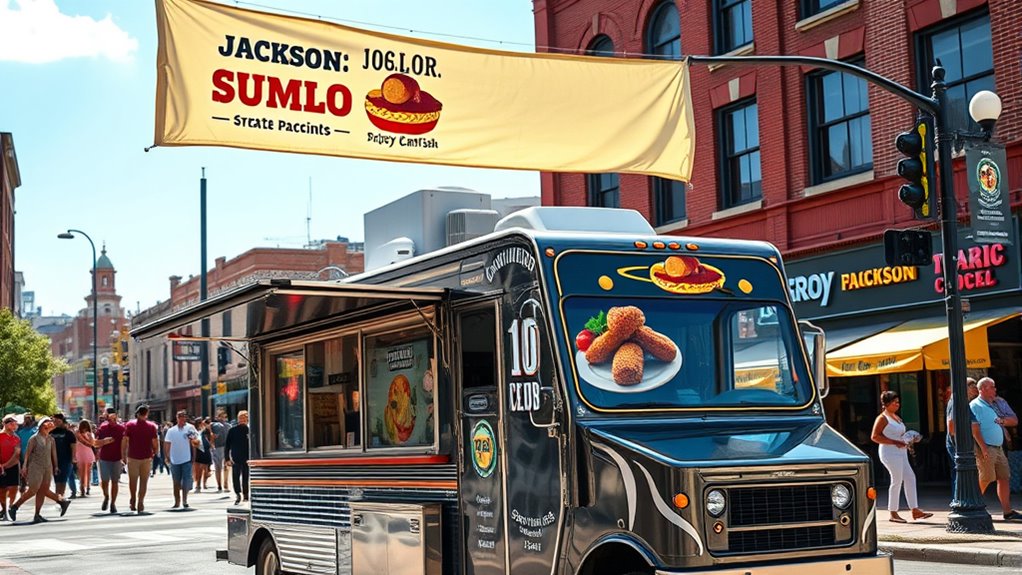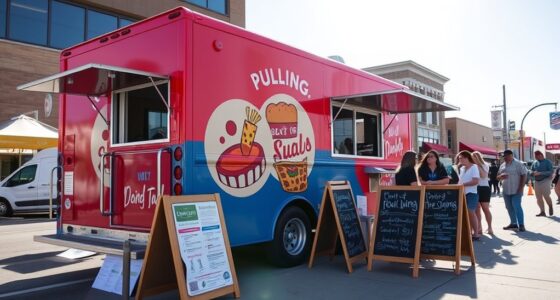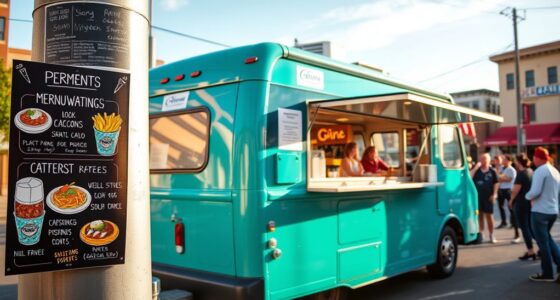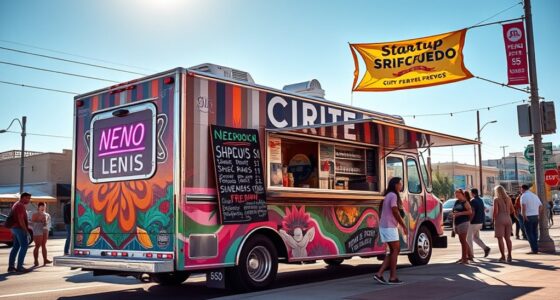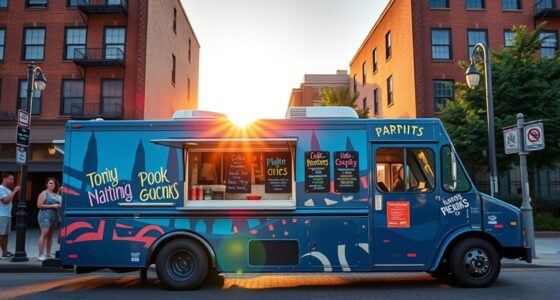To open a food truck in Jackson, Mississippi, you’ll need permits from the Mississippi Department of Health and local authorities, with costs ranging from $1,800 to $28,000. Find suitable vending locations, avoid restricted zones near schools or hospitals, and assure your vehicle meets safety standards. Budget for initial expenses like vehicle, equipment, and permits. Developing a safe menu and marketing through social media and local events will help you grow. To get started, explore these steps further.
Key Takeaways
- Obtain necessary permits from the Mississippi Department of Health and city fire inspections, ensuring all safety and zoning requirements are met.
- Budget for startup costs including vehicle, equipment, permits, licensing, and initial inventory, typically ranging from $35,000 to $115,000.
- Choose menu items suitable for limited space, prioritize food safety, and source ingredients from licensed suppliers to ensure operational feasibility.
- Engage customers through active social media, participate in local events like Food Truck Fridays, and build community partnerships for marketing.
- Comply with vending zone rules, maintain proper distances from schools and hospitals, and secure owner approvals for private locations to ensure legal operation.
Navigating Permit and Certification Requirements in Jackson
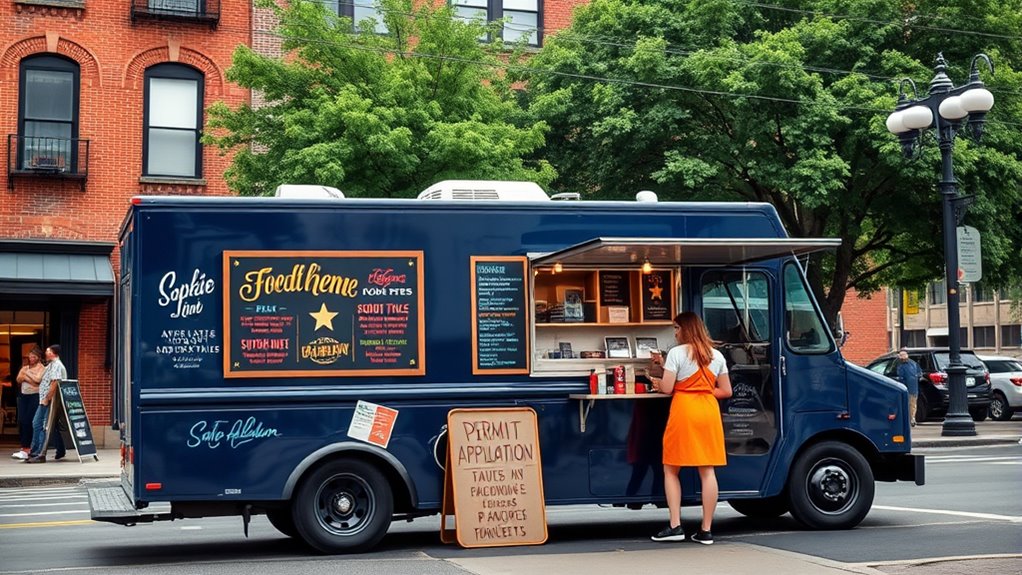
Understanding permit and certification requirements in Jackson can seem complex, but grasping the key steps makes the process manageable. First, you’ll need to submit a complete application with your full identification, including name, address, phone number, and email. If you’re a business entity, include foundational documents like articles of incorporation. You must also hold a valid privilege tax license from any Mississippi city or county. A food service permit from the Mississippi Department of Health (MSDH) is essential, along with approval from the City Fire Inspector. Your mobile unit must operate independently with self-sufficient utilities and use an approved central kitchen or MSDH-certified mobile kitchen. Additionally, you’ll need to obtain a Jackson business license, renew it annually, and secure property owner consent for each location. Display your permits visibly during operation to stay compliant. Recognizing angel number patterns can also provide insights into your entrepreneurial journey and potential success.
Budgeting for Costs and Fees Associated With Your Food Truck
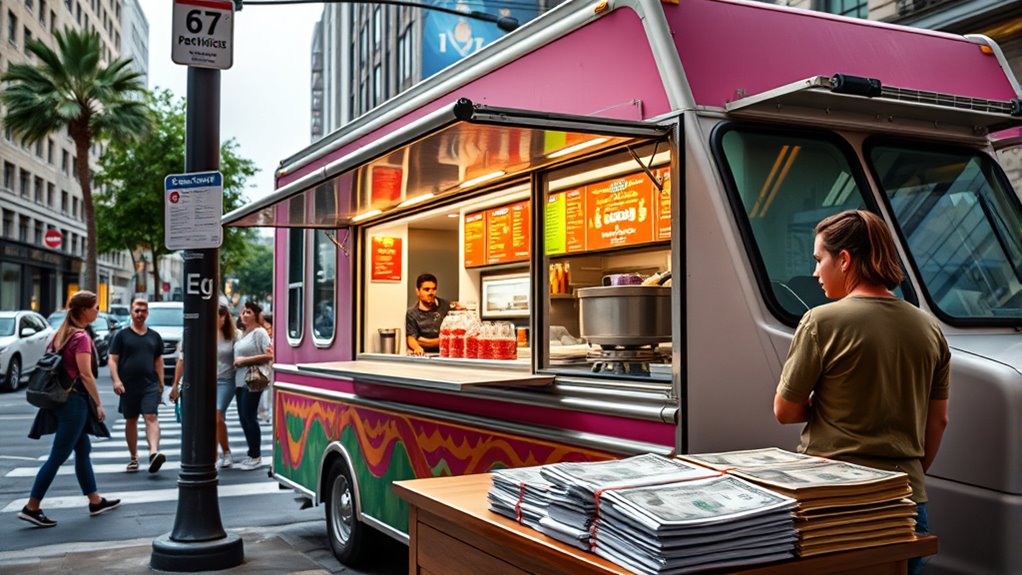
Understanding the costs involved in starting and running your food truck is essential for creating a realistic budget. You’ll need to factor in initial vehicle and equipment expenses, which can range from $30,000 to over $250,000 for custom builds. Equipment costs add roughly $45,000, covering grills, refrigerators, and tools. Renting a truck can cut upfront costs but may increase ongoing expenses. Permit and license fees vary widely, from about $1,800 to $28,000, depending on your location and permits needed. Operating costs include commissary rentals ($300–$800/month), fuel, maintenance, and ingredients averaging $150 daily. Additionally, budget for marketing, which typically consumes 12–20% of revenue, and initial consumables. Planning with detailed tools helps forecast total expenses, often between $35,000 and $115,000 for startup and first-year operations. Proper planning is crucial to ensure all potential costs are accounted for and to avoid unexpected financial burdens. Being aware of regulatory requirements and associated fees can help you stay compliant and avoid costly penalties.
Understanding Location Rules and Zoning Restrictions
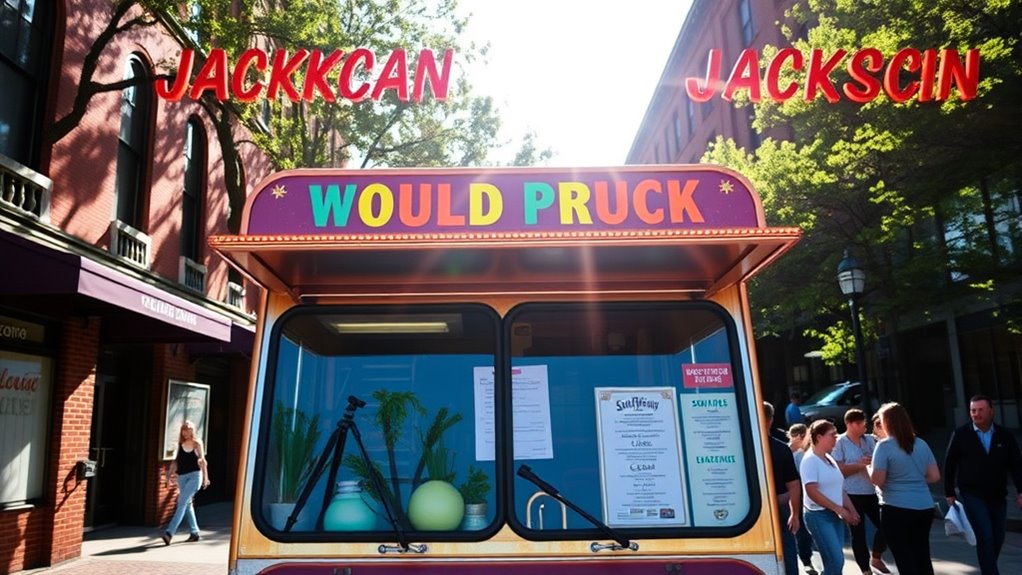
You need to understand the parking restrictions and required distances from certain areas to stay compliant with Jackson’s zoning laws. Designated vending zones help guarantee your food truck operates legally and safely within the city. Following these rules and regulations is essential to avoid fines and keep your business running smoothly. Using supported browsers ensures you can access all relevant information about local ordinances and updates without technical issues. Additionally, understanding sustainable practices can help you align your business with eco-friendly standards increasingly valued by consumers.
Parking Restrictions and Distances
Parking restrictions and distance regulations in Jackson are essential for food truck operators to follow, as they directly impact where and when you can vend. You must avoid parking near sensitive locations like schools and hospitals, following city zoning rules. Additionally, posted “No Stopping” zones and specific distances from fire hydrants, building entrances, and property lines must be respected to ensure safety and accessibility. Failure to comply could result in towing or fines. Keep in mind:
- Avoid parking within restricted zones near schools, hospitals, and reservoir areas
- Maintain proper distances from fire hydrants, building entrances, and property lines
- Obey time-of-day and duration limits for parking in high-traffic zones
- Prevent blocking sidewalks, handicapped access, or fire exits for pedestrian safety
- Check local signage regularly to stay updated on temporary or event-specific restrictions
- Recognize that zoning restrictions can vary based on location and may change over time, so staying informed helps avoid violations.
Designated Vending Areas
Knowing where you can set up your food truck is key to staying compliant with city regulations. You must operate only within designated vending spaces, which are allocated by frontage feet—usually in 10 or 20-foot widths with a 20-foot depth. These boundaries define your vendor footprint, and you’re restricted from moving or trading outside your assigned area without organizer approval. Support vehicles for storage should park nearby but not block the vendor space. You can’t vend within 300 feet of schools during restricted hours or near bus stops, fire hydrants, or building entrances to prevent disruptions and hazards. Additionally, all utilities must be self-contained, avoiding connections to public infrastructure. Proper adherence ensures smooth operation and helps you avoid permit issues or violations. Understanding local zoning rules is crucial to ensure your vending activities are lawful and uninterrupted. Being aware of vending area restrictions and obtaining the necessary permits can save you from potential fines or shutdowns.
Compliance With Zoning Laws
Compliance with zoning laws is essential for food truck operators in Jackson, MS, to operate legally and avoid penalties. You must follow the city’s Mobile Food Vending Ordinance, which designates specific vending areas. Your location must be approved and adhere to rules like maintaining at least 150 feet from restaurant entrances unless waived. Each site requires a separate annual license, limiting you to one location per permit. Also, operations must align with zoning districts, such as commercial or mixed-use zones, while avoiding residential or industrial zones with stricter rules. The ordinance now restricts vendors to pre-designated areas, at least 150 feet from restaurants, with waivers possible if restaurants agree. – Follow designated vending areas and distance restrictions – Obtain a separate license for each location – Ensure zoning compliance for your district type – Adhere to signage and safety requirements. Additionally, it’s important to stay updated on zoning compliance regulations to avoid potential legal issues and fines.
Setting Up Your Food Truck for Safe and Compliant Operations
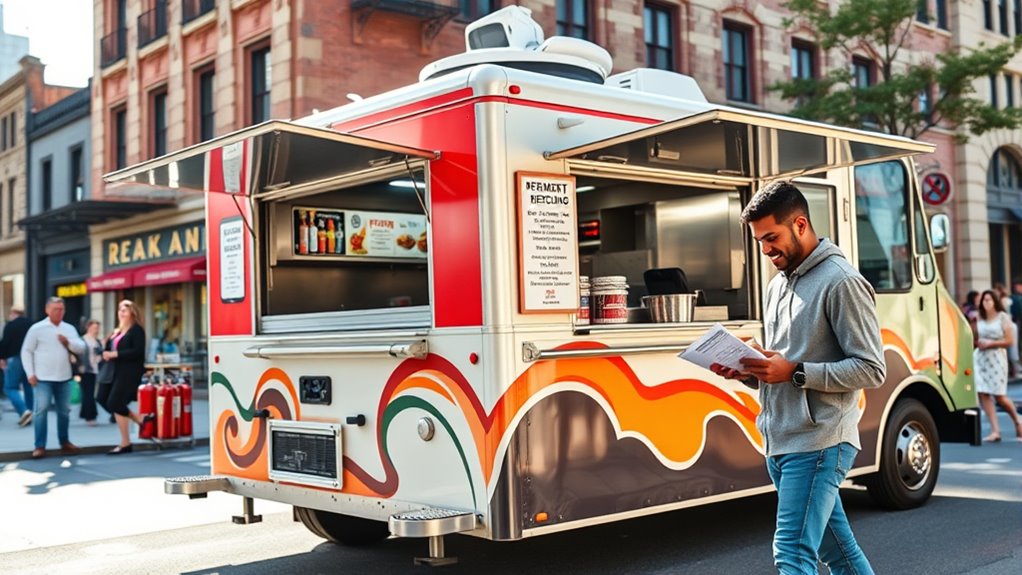
Setting up your food truck for safe and compliant operations starts with understanding local regulations and ensuring your vehicle is properly prepared. You must obtain a food vending permit from the Mississippi Department of Health, filing at least 20 days before starting. Display your permit prominently during operation. Ensure your truck is equipped to meet safety standards, including utilities like water and power, and maintain liability insurance with at least $300,000 coverage. Additionally, incorporating elements of somatic therapy techniques such as mindfulness and body awareness can help manage stress during busy service hours and promote overall well-being for your staff. Pay close attention to parking restrictions, such as only parking on hard surfaces and maintaining safe distances from sensitive areas. Regular food safety inspections are required, and you should meet Mississippi Food Code standards. Proper site plans and owner consents are essential for private locations.
Crafting a Menu That Meets Safety and Feasibility Standards

Designing a menu that aligns with safety and operational constraints starts with selecting items your food truck can handle efficiently. Focus on dishes that can be safely stored, prepared, and served within limited space and equipment. Avoid high-risk foods that require extensive refrigeration or complex cooking processes beyond your truck’s capabilities. Prioritize fresh preparation to reduce bacterial growth and holding times. Use menu boards attached to the vehicle, ensuring they comply with local size restrictions. Incorporate food safety standards to ensure your menu choices meet health regulations and minimize contamination risks.
Choose safe, easily prepared menu items that fit your truck’s space and equipment for efficient, compliant operation.
Consider these points:
- Choose menu items that meet Mississippi Food Code and FDA standards.
- Source ingredients from licensed suppliers and store them properly.
- Limit raw and ready-to-eat foods to prevent cross-contamination.
- Select dishes suitable for batch prep and quick service, simplifying operations.
Developing a Marketing Strategy to Boost Your Food Truck Business
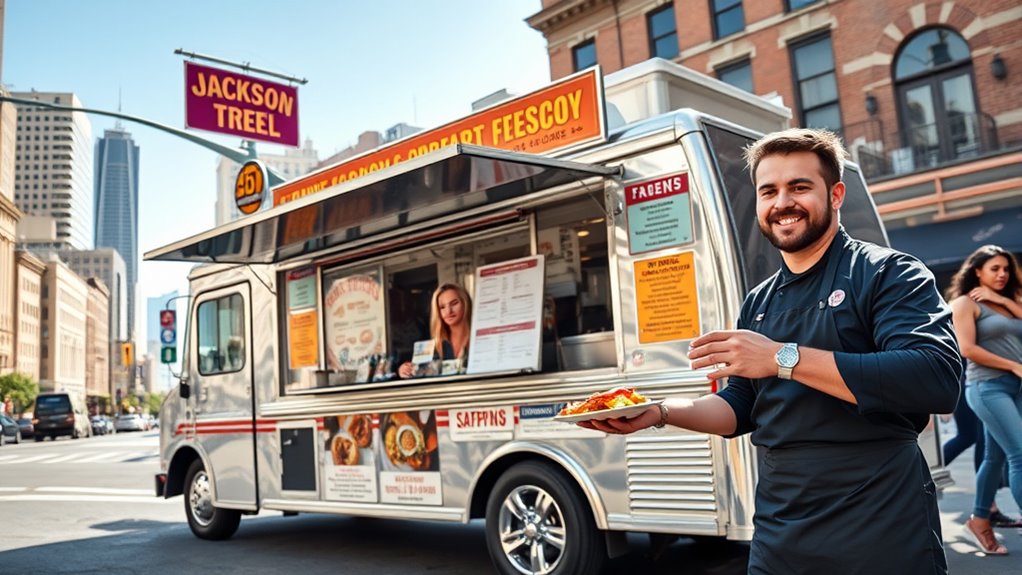
To boost your food truck business, focus on active social media engagement, especially on Facebook, to reach more customers effectively. Participating in local events and festivals can increase your visibility and create valuable customer interactions. Combining these strategies with targeted promotions helps you build a loyal customer base and grow your presence in Jackson. Additionally, incorporating loyalty programs—such as digital punch cards or discounts—can lead to a 30% increase in repeat visits, further strengthening customer retention. Implementing fraud prevention tools like secure payment methods and transaction monitoring can also safeguard your sales and build customer trust.
Social Media Engagement Strategies
Effective social media engagement can markedly boost your food truck’s visibility and customer loyalty. To succeed, focus on creating high-quality visuals like mouthwatering photos and lively videos that showcase your menu and behind-the-scenes moments. Consistency in posting across platforms such as Instagram and Facebook helps maintain reach and relevance. Use authentic, relatable content to forge stronger connections with your audience. Utilizing trending content formats like Reels and Stories can significantly increase your reach and engagement. To deepen engagement, consider these strategies:
- Respond promptly to comments and messages, building trust and relationships
- Encourage customers to share their experiences and feature user-generated content
- Use interactive features like polls and Instagram Stories to increase participation
- Deploy targeted hashtags and location tags to improve discoverability and attract nearby customers
- Incorporate audience feedback into your content to better meet followers’ preferences and boost loyalty
These tactics foster community, boost visibility, and turn followers into loyal patrons.
Event Participation Opportunities
Participating in local events and festivals offers a powerful way to increase your food truck’s visibility and attract new customers. Jackson hosts popular events like the Museum After Hours Food Truck Festival at Mississippi Museum of Art, featuring 20+ trucks and live entertainment, and the Mississippi Makers Fest at Entergy Plaza, showcasing local artisans, food trucks, music, and art. Food Truck Fridays at Smith Park provides a consistent daytime event to build a loyal customer base. Partnering with cultural institutions and community organizations can boost your reach and create cross-promotion opportunities. Choose events that match your menu and target audience, whether family-friendly festivals, niche markets, or cultural celebrations. While costs vary, successful participation can lead to increased sales, brand recognition, and valuable community connections.
Frequently Asked Questions
How Long Does the Permit Approval Process Typically Take in Jackson?
You’re wondering how long the permit approval process takes in Jackson. Typically, it takes between 2 to 6 weeks, depending on your application’s completeness, inspection scheduling, and coordination with health and environmental officials. To avoid delays, submit your plans early, guarantee all requirements like certifications are met, and stay in prompt contact with local authorities. Being prepared helps speed up the approval and gets you on the road faster.
Can I Operate a Food Truck Without a Commissary Kitchen?
Think of operating your food truck as a chef’s daring solo performance—can you do it without the backing of a full kitchen? In Jackson, you can, but it’s tricky. You’ll need a fully self-contained truck with onboard water, waste disposal, and food prep capabilities. Without a commissary, you face strict health laws, higher scrutiny, and limited menu options. It’s doable but requires extra planning, investment, and compliance.
Are There Specific Noise Restrictions for Food Trucks in Jackson?
You need to know Jackson’s noise restrictions for food trucks. The city limits loud noises that disturb neighbors, especially from amplifiers or loudspeakers. Operating hours might restrict noise levels, and trucks aren’t allowed to block entrances or sidewalks. Make sure your muffler is functioning properly, and avoid unnecessary noise during designated quiet hours. Violations can lead to fines, so stay within local noise limits to keep your business compliant and neighbors happy.
What Insurance Coverage Is Recommended for Food Truck Owners?
You should consider essential insurance coverage for your food truck, such as general liability insurance to protect against third-party injuries and property damage. A Business Owners Policy (BOP) combines liability and property coverage, while workers’ compensation is mandatory if you have staff. If serving alcohol, add liquor liability. These coverages help safeguard your business from lawsuits, damages, and unforeseen events, ensuring you stay compliant and financially protected.
How Do I Find Available Parking Spots That Comply With Regulations?
You search for spots that meet city rules, avoid restricted zones, and respect safety distances. You identify designated vending zones, steer clear of fire hydrants and busy intersections, and check posted signage for parking restrictions. You verify surface type—concrete or asphalt—and confirm compliance with zoning laws. You also consult local offices or official portals for updated parking maps, ensuring your truck stays legal, safe, and ready to serve.
Conclusion
Starting your food truck in Jackson is an exciting venture. Did you know that food trucks generate over $2.7 billion annually nationwide? By maneuvering permits, choosing the right location, and crafting a tasty menu, you can tap into this thriving industry. Stay compliant, creative, and strategic, and you’ll be serving up success in no time. With proper planning, your food truck can become a beloved part of Jackson’s vibrant food scene.
